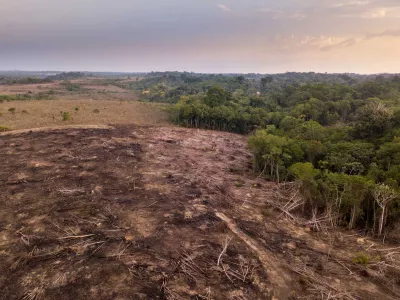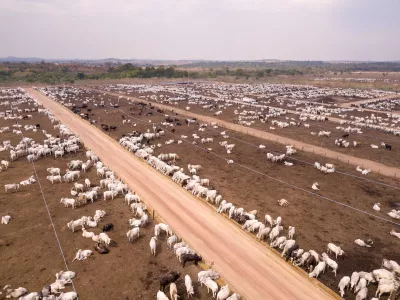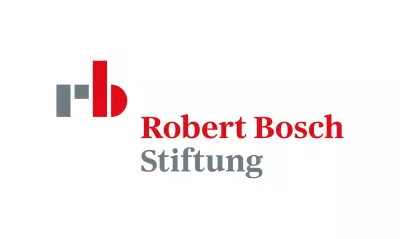An umbrella with holes? The proposal for a Directive on Corporate Sustainability Due Diligence and its potential impact on deforestation

Deforestation in the Amazon rainforest, Brazil. Catastrophic conditions in the value chains of companies are widespread.
The EU Commission has recently presented a proposal for a Directive on Corporate Sustainability Due Diligence. The aim of this Directive is to integrate international standards into European law and prevent negative consequences of global business activities. Can the law contribute to ending deforestation in transnational supply chains?
On 23 February 2022, the EU Commission finally published its long-awaited proposal for a Directive on Corporate Sustainability Due Diligence (CSDD). This legislation is intended to require companies active in the EU market to conduct due diligence to prevent or remedy adverse impacts on human rights or the environment in their value chains.
As the Commission is moving forward with its proposal, the Brazilian government under far-right president Bolsonaro is attempting to push through a series of legislative bills that would further ease the commercial activity on deforested and indigenous-owned land. If passed, the bills would constitute another step in the president’s quest to get rid of existing rules protecting the Amazon rainforest and other important ecosystems and to strip Indigenous peoples of their rights.
Would the law proposed by the EU Commission henceforth prevent companies in the EU market from selling products linked to deforestation and the violation of Indigenous rights? And, in case of non-compliance with the EU law, would the people affected by environmental destruction and human rights violations be able to claim their rights in a European court?
The answer is: If the Commission proposal moves forward in its current form, some of the products related to the destruction of ecosystems and related human rights violations will likely cease to enter the EU market. But some may well not.
Unlike the EU Commission’s proposal for a Regulation on deforestation-free products published in November 2021, the CSDD proposal (formerly Corporate Sustainable Governance initiative) does not only aim at a selection of products linked to deforestation. It obliges companies from all sectors to conduct due diligence to address several negative human rights and environmental impacts along their entire value chains.
We have previously stressed the importance of the CSDD Directive’s horizontal “umbrella” approach for curbing deforestation. The broad scope of the draft Directive could usefully complement the product-specific focus of the draft EU Regulation on deforestation-free products. In a recent study, we recommended that to this end, the CSDD Directive must contain comprehensive environmental due diligence duties and be broad in scope to cover obligations for companies’ entire value chains as well as for small and medium-sized enterprises (SMEs) if these operate in a risk sector. We also argued that the proposal needs to strengthen the rights of the people affected by adverse impacts and provide them with effective access to justice. Unfortunately, the current CSDD proposal, while it would certainly entail some positive steps in the right direction, does not comprehensively address all three of these crucial requirements. In the following, we explain what are the proposal’s most critical shortcomings with regard to deforestation and how they could be fixed.
Comprehensive standalone environmental due diligence duties are needed
First of all, rather obviously, the risk of deforestation in a company's value chain must be covered by its due diligence obligations. The CSDD proposal, at first sight, appears to ensure this: The list of covered violations specified in the annex to the proposal includes “violations of the prohibition of causing any measurable environmental degradation […] that […] affects ecological integrity, such as deforestation”.
However, despite clearly addressing environmental harm, this provision does not form part of the standalone environmental obligations imposed on companies in the annex to the draft Directive.

In September 2021, indigenous peoples protested in São Paulo against a proposed law by the Brazilian government that targets their territories.
It is instead listed as one of the human rights obligations. Human rights and the integrity of the environment, including forests, are indeed interlinked, and the recognition of this link in the proposal is very welcome. Moreover, the CSDD proposal obliges companies to respect several other human rights that are crucial for the prevention of deforestation, such as those enshrined in the United Nations Declaration on the Rights of Indigenous Peoples (UNDRIP), the most important internationally agreed document on Indigenous rights. Nevertheless, and although the deforestation-centred human rights obligation cited above is rather broad, the link between deforestation (or the degradation of other ecosystems) and the violation of someone’s human rights may not always be immediately apparent to companies. The proposal suggests that deforestation, by affecting ecological integrity, is per se to be understood as a human rights risk that must be prevented. Yet, companies may try to choose a narrower interpretation and concentrate only on cases where someone’s livelihood is directly and visibly affected, such as in the case of Indigenous peoples’ traditionally owned land that is degraded.
Standalone environmental due diligence obligations that clearly refer to the risk of deforestation may thus be necessary. While the reference to article 10 (b) of the Convention on Biological Diversity in the annex to the proposal may have some impact, it appears rather unlikely that it will be interpreted as prohibiting all types of deforestation. Nor should one expect that the rather vague climate-related obligations in article 15 of the proposal would substantially contribute to the prevention of deforestation.
Overall, the combination of environmental human rights obligations and the rather fragmentary references to a selection of international environmental agreements in the CSDD proposal do not constitute the comprehensive environmental due diligence duties that are needed to clearly address all types of deforestation and ecosystem degradation.
Incomplete due diligence obligations
Second, it is an important step forward that the CSDD proposal, in principle, establishes due diligence obligations for companies’ entire value chains. Yet, the fact that due diligence, according to the proposal, only needs to be conducted concerning “established business relationships” curtails these obligations substantially. This proposed carve-out incentivises companies to frequently switch suppliers in order to escape their due diligence duties – a practice that would go diametrically against the idea of due diligence, which precisely seeks to encourage lasting business relationships as a means to exert leverage.

Cattle grazing on a farm in the Brazilian Amazon region. Cattle farming is one of the major drivers of deforestation.
© Shutterstock
Further dangerous loopholes in the proposal concern the scope of the companies required to perform due diligence in the first place. It is positive that agriculture and forestry, both major drivers of deforestation, are defined as risk sectors in the proposal, which means that the due diligence obligations in these sectors will apply to all companies with more than 250 employees and an annual net turnover of more than 40 million euros (and not only to companies with more than 500 employees). This threshold, however, falls too short since it entirely excludes SMEs. Under the proposed rules, SMEs would only need to conduct due diligence if they happen to operate in a bigger company’s value chain.
In addition, contrary to its classification by the Organisation for Economic Co-operation and Development (OECD), the financial sector is not only not defined as a risk sector but is also excluded from key obligations that apply to all other sectors. Thus, the proposal requires financial undertakings to perform due diligence only with regard to the immediate clients of a financial service (instead of the entire value chain) and only where these are not SMEs. This goes clearly against international standards such as the UN Guiding Principles on Business and Human Rights. A significant risk remains that the financing of deforestation will be left largely unchallenged, despite many studies having pointed out investors’ links to deforestation.[1]
More proactive stakeholder consultation could help prevent deforestation
Third, the proposal breaks ground in that it establishes the civil liability of companies where they do not meet their due diligence obligations. This is a crucial precondition for affected individuals and groups – such as Indigenous communities who have been deprived of their land or resources – to enjoy access to justice. However, the possibility of civil liability alone cannot guarantee an effective remedy. Further conditions must be met. One of these is a fair distribution of the burden of proof, as a necessary prerequisite for successfully suing a company for damages in the first place. Currently, claimants often face severe difficulties proving their case in court due to the lack of access to the necessary internal company documents. This issue remains unaddressed in the CSDD proposal, as do the costs for access to justice and the limitation periods for filing a lawsuit.
More generally, the CSDD proposal does better than the draft Regulation for deforestation-free products when it comes to focussing on affected people and stakeholders by linking environmental harm with human rights risks and laying the ground for those people to claim redress. Unfortunately, though, the inclusion of stakeholders provided for in the proposal is largely reactive. The rules for proactive consultations with stakeholders on companies’ concrete due diligence activities are very weak.[2] If the ultimate aim is to prevent deforestation, and not only to remedy its effects once it has already occurred, companies should be obliged to actively and meaningfully consult with the affected stakeholders on the identification of environmental and human rights risks and the development of strategies to prevent or bring to an end adverse impacts.
The EU should strive for regulatory coherence
It would be misleading to view the CSDD draft as an instrument that can simply “fill the gaps” of the EU proposal on deforestation-free products. What the EU should strive for is regulatory coherence. By their nature, the two proposals have different scopes. It is precisely the added value of the CSDD proposal with regards to preventing deforestation that it covers certain aspects which the deforestation-focused proposal does not. However, the two EU proposals should not need to compensate for each other’s shortcomings but draw on the same strong standards wherever possible. Such coherence is the precondition for the CSDD Directive to function as an effective horizontal umbrella law, with the Regulation on deforestation free-products providing more detailed product-specific rules. While both types of legislation are necessary and important, they should be well coordinated.
Thus, the CSDD proposal can serve as a role model for the Regulation on deforestation-free products when it comes to the inclusion of human rights and civil liability as well as broad due diligence obligations beyond any safe harbour clauses (such as supposed “low-risk countries” with stripped-down due diligence duties). At the same time, for the CSDD proposal to effectively curb deforestation itself, its own loopholes must be closed: Unambiguous standalone environmental due diligence duties would need to be introduced, due diligence should apply to all companies, including the financial sector and beyond “established business relationships” only, and effective stakeholder consultations and access to justice would need to be secured.
Both the CSDD proposal and the proposal for deforestation-free products are now up for discussion within the European Parliament and the Council. The deforestation proposal is slightly ahead, with the respective informal “trilogues” between the Commission, Parliament and Council expected to begin in autumn. For the CSDD proposal, the trilogue can be expected to start in 2023. The Council and Parliament should now make use of the fact that both proposals are being discussed in parallel to push for a harmonized and ambitious package of EU rules to prevent imported deforestation.
[1] See, for example, Global Witness, “Deforestation Dividends”, 22 October 2021, https://www.globalwitness.org/en/campaigns/forests/deforestation-dividends/#deutsche-bank-risks-inaction-are-substantial [Last retrieved: 2022-3-30]; and Amazon Watch, October 2020, Complicity in Destruction III, https://amazonwatch.org/assets/files/2020-complicity-in-destruction-3.pdf. [Last retrieved: 2022-3-30], pp. 36-45 and 76-77.
[2] Shift, The EU Commission’s Proposal for a Corporate Sustainability Due Diligence Directive, March 2022, https://shiftproject.org/resource/eu-csdd-proposal-analysis [Last retrieved: 2022-3-30], p. 7.
Our engagement for sustainable agricultural supply chains that protect the environment and human rights is supported by the Robert Bosch Stiftung.

Author(s)Finn Robin Schufft |

